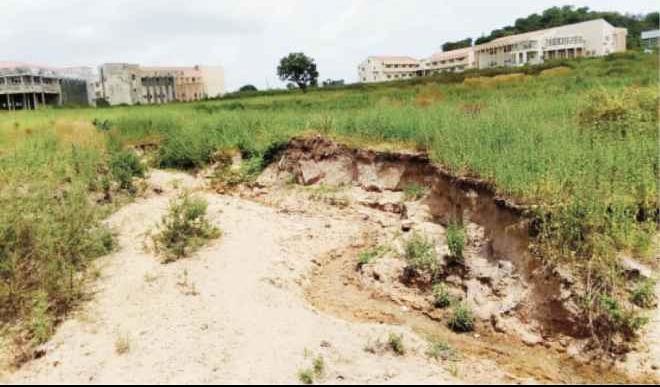Abandoned projects, erosion threaten Lokoja varsity
The Federal University, Lokoja (FUL) is among the 12 universities established by the Federal Government between 2010 and 2011 to accelerate equitable access to higher education in Nigeria, as well as build institutions that can support the nation’s drive for rapid development through the availability of quality manpower. The university commenced activities on February 16, […]


The Federal University, Lokoja (FUL) is among the 12 universities established by the Federal Government between 2010 and 2011 to accelerate equitable access to higher education in Nigeria, as well as build institutions that can support the nation’s drive for rapid development through the availability of quality manpower.
The university commenced activities on February 16, 2011 at its temporary site in Adankolo area of Lokoja with two faculties: Arts and Social Sciences, which had five departments, and Science, which had six departments.
However, after operating at its takeoff site for about five years with its growing students and staff population of over 5,000, the university is now choked and heavily weighed down by space constraints as there is no room for expansion, hence the urgent need to move to its permanent site.
Although, the university has its permanent site which is about 750 hectares situated along the Abuja-Okene expressway on the outskirts of Lokoja town, movement to the site has remained impossible over the years due to a myriad of challenges.
Daily Trust reports that there are two different sets of projects at the permanent site awarded to contractors and coordinating/institutional consultants between 2012 and 2013 with the Tertiary Education Trust Fund (TETFUND) as the funding agency.
The 2012 projects, tagged, ‘Construction of Prototype Buildings in Nine Federal Universities’, include the administrative block, ICT centre, library and two faculty buildings.
Daily Trust learnt that the 2012 projects which were awarded by a former president’s (Jonathan) government at the cost of N2bn, has Multi-System as the Central Coordinating Consultant, while Ba-Has Nig Ltd serves as the institutional consultant.
Findings at the site indicate that while some of the projects have been completed, others have been abandoned.
The two faculty buildings which were awarded to Extended Global Services Ltd at the cost of N990m have been abandoned.
The administrative block has also been completed but is yet to be furnished.
The 2013 project on the other hand comprises the construction of hostels for both males and females awarded to two different contractors at the cost of N1.5bn.
The male hostel awarded to Messrs Star Nig at N567.4m has been completed, furnished and handed over to the university.
However, the female hostel which was awarded to Messrs Chanto Engineering at N571.7m, is yet to be completed.
The Acting Director, Physical Planning Development Department of FUL, Architect Abdulkadir Ibrahim Gana, noted that there were a lot of issues with the ongoing female hostel project, adding that an “integrity check” must be conducted on the entire structure upon completion before the university took over.
There are also concerns that the contractors rather than site the projects on the vast plane portion of the university land, moved to hinterland and sited the structures in valleys and hilly areas where there are serious threats of gully erosion.
Vice Chancellor of FUL, Prof. Angela Freeman Miri, expressed concerns thus, “I am of the strong belief that when the contractors came, they never sought inputs from the university management. The contracts were awarded to them in Abuja by the last administration.
Speaking further, the VC said, “When the contracts were awarded, I was told that the contractors did not consult the university authority and so they just constructed what they felt like constructing without any input from the university.
“But I believe that in constructing such structures, the end user, which is the university, should have been involved because the interest of the end user is paramount.
“As far as I am concerned, in a permanent site of that magnitude, we expect high rising structures befitting of a modern university and not those kind of midget structures that they put in place there.
“Putting up those structures that look like secondary schools is not the best because it will not take time before the university exhausts its available space.
“We are calling on the Federal Government to come to our aid in opening up the entire campus there. We need feeder roads, access roads, electricity, university gate house and we also need those abandoned structures completed,” she said.
The Project Manager in charge of the female hostel, Engr. Foster of Chanto Nig Ltd, attributed the delay to bottlenecks experienced at the take-off of the project and undue delay in payments by the Federal Government.
He, however, debunked the allegations that he was doing a shoddy and poor job, saying that the ongoing project was of good standard and that he used the best materials.
When contacted, the representative of Ba-Has Nig Ltd said, “We do not really have comments to make on all these issues you have raised: these projects were awarded by the National Universities Commission (NUC). Go there and find out.”
